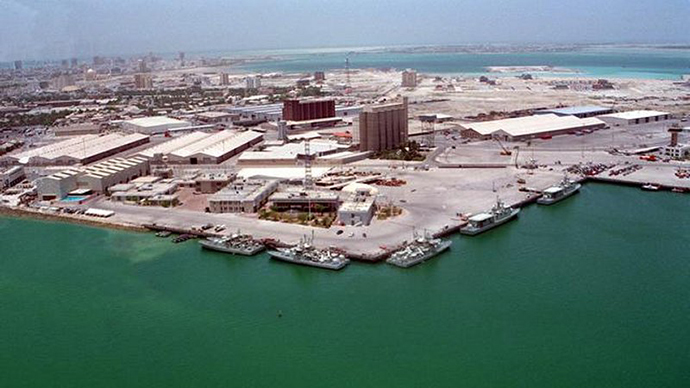The United Kingdom recently opened a military base in Bahrain in an effort to bolster its role as a “major player” in the Middle East. Presiding over the formal ceremony last Thursday, Prince Andrew officially opened the base in front of a crowd including Bahraini Crown Prince Salman bin Hamad Al-Khalifa. The base is the UK’s first new permanent base in the Middle East since 1971. The UK will be able to operate larger warships in the Arab Gulf with support from the new £40 million base at Mina Salman. The base will accommodate 500 British soldiers, airmen, and sailors. The human rights situation in Bahrain has been deteriorating even more this past year, so the UK leadership chose an inopportune time to highlight the increasing relationship by opening the base and inviting Prince Salman to attend. Further, this instance of public affinity between the leaders of the two countries is part of a larger trend in which the UK demonstrates its commitment to the alliance.
Even as the UK and Bahrain have deepened their bilateral relations, the British and Bahraini royal families have remained close. Despite rights groups’ alarm and concern over Bahrain’s treatment of pro-democracy protesters, civil society members, and human rights defenders, including credible allegations of torture, enforced disappearance, and arbitrary detention, the Queen of England invited King Hamad to her 90th birthday celebrations two years ago. Then, last year, she accepted a gift of a stallion from King Hamad.
The Queen’s gift of the stallion in October of 2017 came less than a month after Amnesty International released a report stating that Bahrain had refused to implement promised reforms and authorities had dramatically escalated the repression of political dissidents and rights defenders. As part of this repression, UK-based Bahraini activists reported that their families were being harassed, threatened, and detained back in Bahrain, but the UK has not taken adequate measures to investigate such reprisal attacks. In response, Sayed Ahmed Alwadaei, the director of advocacy at the Bahrain Institute for Rights and Democracy, told Middle East Eye: “The Queen is now seen to reward the King of Bahrain, despite the fact that he has taken his citizens’ family members as hostages in cowardly attempts to prevent UK-based Bahraini people from protesting. This gift is effectively a green light, signalling [sic] that the Queen has no issues with the Bahraini royal.”
Britain’s close relationship with Bahrain also extends into the field of security cooperation. Just this month, Britain was criticized for having trained Brigadier Fawaz Hassan Al Hassan, the police chief who oversees the facility where authorities abuse and torture political dissidents. As the most senior police officer in the city of Muharraq, he presides over the prison where Bahraini security forces beat and sexually assaulted Najah Ahmed Yousif, a peaceful dissident detained for campaigning on social media. Ebtisam Alsaegh, another Bahraini woman advocating for human rights on social media, alleges that security forces raped her in the same police station one month later.
The UK has frequently justifies its cozy relationship with Bahrain by claiming that Bahrain’s national human rights institutions demonstrate the county’s progress in protecting and promoting human rights. However, Bahrain’s National Institute for Human Rights does not fully comply with the Paris Principles governing national human rights institutions, having failed to obtain an “A” ranking and earning only a “B” status. It’s failure to obtain an “A” grade stem from its insufficiently transparent member appointment process, lack of independence from the government, its failure to fully support all complaints and human rights defenders, lack of satisfactory monitoring of detention rooms, and lack of adequately cooperation with other human rights bodies.
Bahrain’s western allies, which include not just the UK but also the US, must stop militarily and diplomatically showing the unabashed support they have been exhibiting towards Bahrain. Western allies have military bases in Bahrain and make massive arms sales to the Gulf Kingdom. This cozy business and military relationship is further supported by Western leaders’ personal friendship with King Hamad, which casts doubt on their willingness to raise human rights concerns. In the case of the UK, the government’s repeated failure to raise concerns about human rights at a high level demonstrates the British government’s prioritization of business ties over widespread systematic abuses like torture and executions.
Giacomo Mattei is an Advocacy Intern at ADHRB





